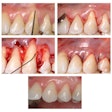
Once the brightest flower in the health food field, fruit juice has come under a cloud lately. Sure, it's chock full of vitamins, but as public health experts point out, it's also too sugary, and the acid erodes tooth structure. Now a new day may be dawning; a study in the December Journal of the American Dental Association suggests that calcium can counteract the acid in the juice.
Juice makers offer calcium-fortified juices as a way of preventing osteoporosis, but University of Iowa researchers reasoned that the mineral could stop erosion as well.
To test their hypothesis, the investigators painted extracted teeth with fingernail polish, leaving windows of enamel exposed on some and root exposed on others. They soaked half the teeth in regular versions of apple, orange, white grape, and grapefruit juices. They soaked the other half of the teeth in calcium-fortified versions of these same juices.
After 25 hours, they took the teeth out of the juice and put them under microscopes. As expected, they found that the calcium-fortified juices eroded the teeth much less than the standard juices did. The standard juices ate lesions in the enamel averaging 69 to 187 micrometers in depth, depending on the juice. But the calcium-fortified apple, orange, and grapefruit juices did not create any measurable lesions at all. The calcium-fortified grape juice created lesions less than half the size of those created by the regular grape juice.
Calcium did not prevent lesions in roots, but it did reduce them significantly.
This laboratory study confirmed earlier findings by European researchers. So far no one has published any studies testing calcium-fortified juices on teeth in living human mouths where bacteria and saliva come into play. But the researchers concluded that patients' whose teeth are eroding from juice should switch to the calcium-fortified versions. All things in moderation, though: they warned that patients shouldn't guzzle so much of these juices that they get fat from the sugar or overdose on calcium.



















